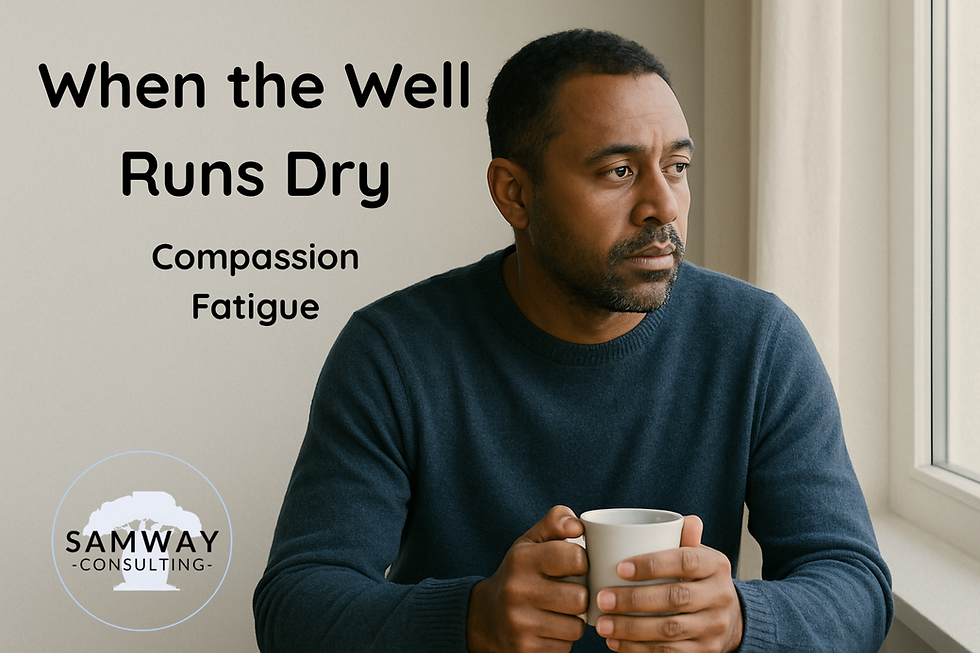Grief: When it's difficult to say 'Good-bye'
- Wayne George
- May 3, 2021
- 3 min read

We all experience loss in life, seasons of change where that which we were once used to, is no longer there - a loved one who used to sit across from us at the dinner table, a faithful pet that would run to meet us when we got home from work; a family home that we were forced to sell due to changing circumstances. When that loss occurs, we are left having to process the void, the emptiness, the grief.
What is Grief?
Very often, grief is associated only with the death of a loved one. While death is certainly a major cause of grief, grief is a natural response to any form of loss.
the loss of a loved one,
the loss of a relationship (eg. divorce),
the loss of a pregnancy (eg. miscarriage),
the loss of a pet,
the loss of a job
the loss of a certain way of life;
children leaving home,
infertility
separation from friends and family (eg. immigration, moving interstate, etc)
These can all constitute losses in their own right, and hence, can be accompanied by grief.
Of course, the greater the loss, the more intense the grief is likely to be.
What are some effects of grief?
Grief can affect different areas of one's life:
emotions,
thoughts
behaviour
beliefs
physical health
sense of self and identity
relationships with others.
Some common feelings associated with grief, include sadness, anger, anxiousness, shock, regret, relief, being overwhelmed, isolation, irritability or numbness.
How is grief expressed?
Grief is expressed in many ways and has no set pattern. It is experienced differently from person to person and even from culture to culture. Timeframes for grieving vary from weeks and months for some, to many years for others. What this means for you if you are struggling through a season of grief, is that there is no 'right' or 'wrong' way to grieve. Be patient with yourself, give yourself time to heal; there is no need to rush the process. The key, however, is that despite the pain you are feeling, you have a general sense of moving forward in that grief. Are new helpful habits being formed around your loss? Are you finding new ways of 'doing life' in a meaningful way, despite the loss?
How is grief processed/worked through?
As mentioned before, grief looks different for different people. It is important, whatever that season looks like for you, to have the support of others (eg. friends, family, colleagues, a counsellor); an empathetic listening ear to talk to about your loss and to unpack the feelings that are being felt as a result.
How can a counsellor help me process my grief?
A professional counsellor/therapist will come alongside you and journey with you in your season of grief. Through empathetic listening and engaging, your therapist will help you find healthy ways to cope with the pain that, in time, can renew you and permit you to move forward.
He/she will help you become aware of any intrusive, unhelpful thoughts and also identify and work through some of the resultant emotions.
What can I do to help myself?
Don’t be afraid to reach out.
Talk to someone (friends, family, spiritual leader, professional counsellor, etc) about how you are feeling.
Look after your physical health. In this exhausting and draining time, it's important to eat a healthy diet, to exercise and to sleep.
Manage current stress and minimise potential stressors. Remember to reach out and ask for help with chores, etc.
What do you enjoy doing? (writing, drawing, walking on the beach?) Well, do it. You may not always feel like it in this season, do it anyway.
How can I help someone who is experiencing grief and loss?
In a nutshell, just be there! You don't have to have the right words to say, in fact at times, the less said the better. A simple offer of love and support can go a long way.
Ask how they're feeling (and then be willing to genuinely listen to their response).
It's OK to engage in 'small talk', or subject matter other than their loss.
Offer some practical help (doing the shopping, cooking a meal, offering to do something enjoyable with them, etc).
Encourage them to speak to a counsellor or their GP if they need it.
If you are facing a difficult season of grief, remember that this, like any other season, will pass - it may not look like it now - and you can and will be OK. Be kind to yourself! Allow yourself the time needed. Reach out - there are people willing to help.
________________________________
If you or someone you know can do with an empathetic listening ear, do contact Samway Counselling Services today and let's journey together:
Telephone/ Text/ Whatsapp: 0432 816 005
Business Card: https://card.link/items/sGS6pmOGAu






Comments